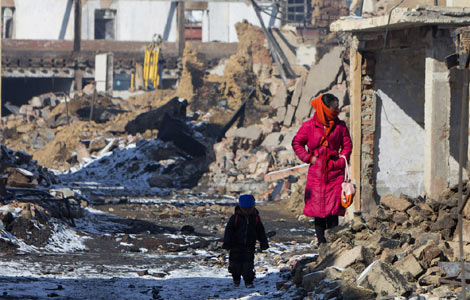Syria peace conference opens in Switzerland
Updated: 2014-01-22 17:30
(Agencies)
|
|||||||||||
CONFERENCE AGENDA
Assad's representatives may highlight the threat to the West and its Arab allies from al Qaida and other militants fighting his forces. But Western leaders say they fully back opposition demands that Assad step down, something they say was the conclusion of the UN conference in Geneva 18 months ago.
|
More about Syria peace talks China expresses hope for Syria talks |
Russia endorsed that communique but has disagreed with Western powers which say that, by calling for a transitional government in Damascus, the meeting known as Geneva 1 made Assad's removal a condition for a peace settlement.
Neither side in Syria has either appeared able to complete a victory. Though much divides the rebels, who have been fighting among themselves, they are united in wanting Assad out. So reaching a settlement that satisfies both sides seems a distant prospect.
Discontent stretches back to the rule since 1970 of Assad's father, who took power in a military coup, but it boiled over in March 2011 as Syria's drought-hit economy struggled and the Arab Spring uprisings in Tunisia and Egypt inspired protests.
When those were crushed, the revolt became a war that has taken on an increasingly sectarian complexion, setting majority Sunnis against Assad's Alawite community, an offshoot of Shi'ite Islam. It has also drawn in rival powers with Saudi Arabia and Qatar backing the rebels and Iran standing by Assad.
Al Qaida-linked militants and other Islamists have emerged as the most powerful forces on the rebel side, dampening Western appetite for direct intervention. Iran and its Lebanese Shi'ite ally Hezbollah have helped Assad. And violence has spread, notably to neighbouring Iraq and Lebanon.
For all the low expectations on Lake Geneva, millions of Syrians in refugee camps hope something will change. "Let them please find a solution for this problem," Mohammed from Homs said at a UN centre in Lebanon. "Let us go home."
Related Stories
Russia saved Syria from the fate of Libya 2014-01-22 16:08
US, Russian leaders discuss Syria, Iran, Sochi Olympics 2014-01-22 13:36
Davos forum founder sees Syria, Iran in spotlight 2014-01-21 13:40
UN withdraws Iran invitation to Syria talks 2014-01-21 11:33
Syria peace conference to proceed without Iran 2014-01-21 10:00
Today's Top News
Man, 36, executed for rape, murder of sex slaves
Beijing court accepts GM spat defamation case
Obama, Putin discuss Olympics security in call
Japan seeks US understanding about dolphin hunt
Belarus expects more from Silk Road
Suspected cyberattack on China
China, EU talking investment
Li hails work of foreign experts
Hot Topics
Lunar probe , China growth forecasts, Emission rules get tougher, China seen through 'colored lens', International board,
Editor's Picks

|

|

|

|

|

|





